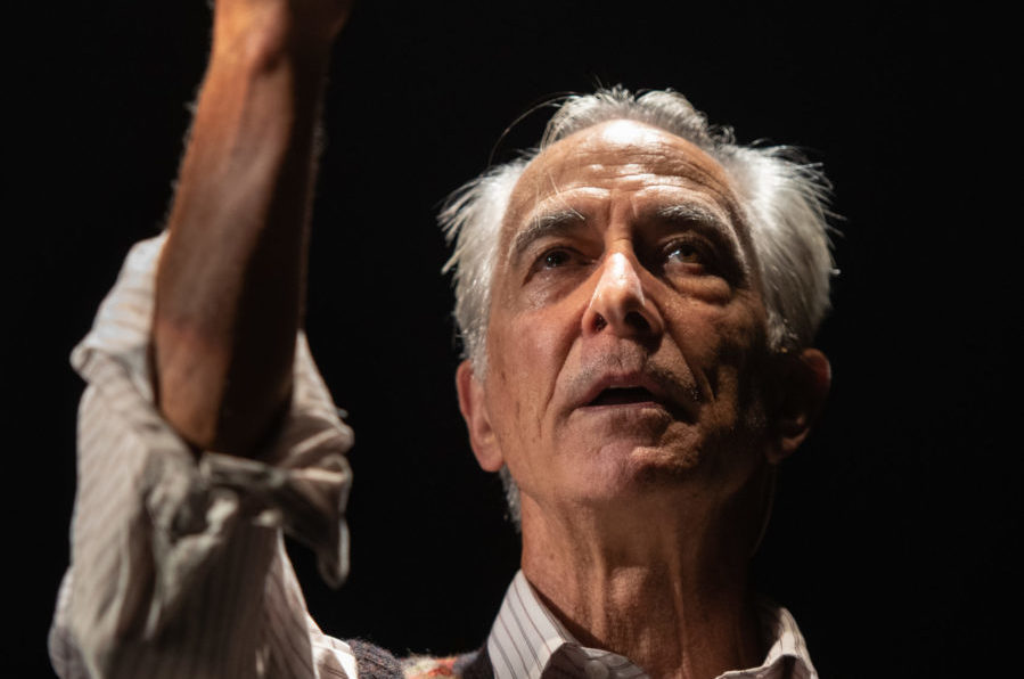REMEMBER THIS: THE LESSON OF JAN KARSKI
by Clark Young and Derek Goldman
Directed by Derek Goldman
Starring David Strathairn
Polonsky Shakespeare Center
A Production of Theatre for a New City
Reviewed by David Spencer
To summarize the odyssey of Jan Karski is even more than his Wikipedia page can do, let alone this review, though the one-actor play, Remember This: The Lesson of Jan Karski by Clark Young and Derek Goldman, at the Polonsky Center in Brooklyn (not far from BAM) does a fine job of presenting the essence. The boilerplate describes him as “the Polish WWII hero and Holocaust witness…who risked his life to carry his report of the Warsaw ghetto from war-torn Poland to the Allied Nations and the Oval Office, only to be disbelieved.”
He spent much time captured, imprisoned and tortured himself, all the while keeping his true rank and identity secret, eventually escaping and being recruited into the Polish underground. The play, drawn from his words, includes these, which particularize his assignment:
“My job was just to walk. And observe. And remember. The odour. The children. Dirty. Lying. I saw a man standing with blank eyes. I asked the guide: what is he doing? The guide whispered: “He’s just dying”. I remember degradation, starvation and dead bodies lying on the street. We were walking the streets and my guide kept repeating: ‘Look at it, remember, remember.’ And I did remember. The dirty streets. The stench. Everywhere. Suffocating. Nervousness.”
Harrowing, of course. Followed, as indicated above, by delivering his reports to disbelieving Western leaders; not, as you might expect, with the rage of desperate urgency…but rather like a human data recorder switched to PLAY. Several times he says, “I was a machine,” delivering his message of horror with reportorial dispassion.
And it is this which may have you, as observer by proxy, having one of two reactions.
Before I go there, what’s vital to note is this: David Strathairn, as Karski, is giving a tour de force performance as at odds with what tour de force usually conjures—since the very essence of Karski is at odds with an outgoing personality. Strathairn’s portrayal is by no means bereft of feeling, but the intense bursts of it escape like sudden steam from a pressure cooker, whereupon he immediately clamps down again; for most of the rest, he is haunted. Amazed and horrified, yes, but we see that in how he has deadened himself, shut himself down so as not to be overcome. (Which is not to understate how intensely physical Strathairn’s performance is. The actor is 72 years old, and in the aftermath of seeing him recreate, by potent, brush stroke suggestion, Karski’s memories of capture, imprisonment, abuse, disguise and especially escape…you can only marvel at how fit he must keep himself. A lesson perhaps not altogether removed from the drama; to survive, Karski must have drawer on reserves of physical as well as mental strength.)
Back to you as observer. You may have the reaction of one who responds empathically to to the conjured images of suffering, and the enormity of what Karski has been through; the very idea of the enormity. Or…you may find yourself, as I did…abstracted from it—and I speak as a Jew having seen many Holocaust dramas that’s have triggered very deep feelings. This is not remotely a criticism; I think observing the observer from a similar remove is a perfectly valid response, that takes nothing away from the theatricality or compelling nature of Remember This. Indeed, I would argue that Remember This is, intentionally or not—and I believe intentionally—built for that experience. The payoff for having it, if that’s the word, is your own astonishment at how thoroughly Karski is disbelieved and by whom, even as none will accuse him of fabrication. But of course they’re all dead now. What do you, hearing these facts, do with that retroactive rage? Like Karski, you shut it down. As if the play means to tell us—to remind us, really—that we are all potentially capable of feeling so deeply that we enter a state of morphia as the only way to protect ourselves.
But the play also states—explicitly, via a framing device, before Strathairn steps into character, and again, more briefly, when he steps out of it—that we might directed toward correcting the ills of today’s world that threaten us with darkness once again.
Which is of course the true test of how “Karski” any of us may have the capacity to be.
It’s worth hearing the question. And thinking about the answer.
